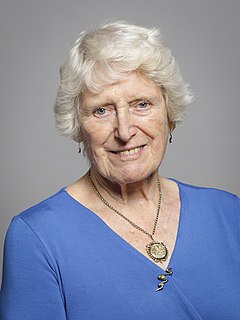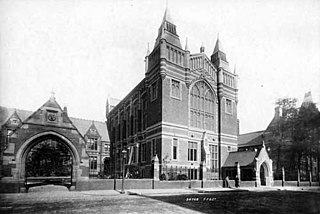
The Birmingham Six were six Irishmen who were each sentenced to life imprisonment in 1975 following their false convictions for the 1974 Birmingham pub bombings. Their convictions were declared unsafe and unsatisfactory and quashed by the Court of Appeal on 14 March 1991. The six men were later awarded financial compensation ranging from £840,000 to £1.2 million.
Sir Samuel Roy Meadow is a British retired paediatrician. He was awarded the Donald Paterson prize of the British Paediatric Association in 1968 for a study of the effects on parents of having a child in hospital. In 1977, he published an academic paper describing a phenomenon dubbed Munchausen Syndrome by Proxy (MSbP). In 1980 he was awarded a professorial chair in paediatrics at St James's University Hospital, Leeds, and in 1998, he was knighted for services to child health.

Ann Elizabeth Oldfield Butler-Sloss, Baroness Butler-Sloss, GBE, PC, is a retired English judge. She was the first female Lord Justice of Appeal and was the highest-ranking female judge in the United Kingdom until 2004, when Baroness Hale was appointed to the House of Lords. Until June 2007, she chaired the inquests into the deaths of Diana, Princess of Wales, and Dodi Fayed. She stood down from that task with effect from that date, and the inquest was conducted by Lord Justice Scott Baker.
Barry Michael George is an Englishman who was found guilty of the murder of English television presenter Jill Dando and whose conviction was overturned on appeal.
Sir David Cozens-Hardy Hirst was an English barrister and judge who served as a Lord Justice of Appeal from 1992 to 1999. The Times described him as "one of the leading advocates of his generation".

The doctrine of legitimate expectation was first developed in English law as a ground of judicial review in administrative law to protect a procedural or substantive interest when a public authority rescinds from a representation made to a person. It is based on the principles of natural justice and fairness, and seeks to prevent authorities from abusing power.
Sir Alfred William Michael Davies was a British barrister who served as a High Court Judge from 1973 to 1991. He was one of the first judges appointed specifically to hear defamation cases, one of the few areas of civil law in England in which a jury remains the tribunal of fact, and was in charge of managing the list of libel cases from 1988 to 1991. In retirement, he conducted a visitor's inquiry into allegations of poor academic standards at University College, Swansea in 1992 to 1993, and was instrumental in the foundation of the Expert Witness Institute in 1996.

In the legal jurisdiction of England and Wales, there is a long tradition of jury trial that has evolved over centuries.
Modern libel and slander laws in many countries are originally descended from English defamation law. The history of defamation law in England is somewhat obscure; civil actions for damages seem to have been relatively frequent as far back as the Statute of Gloucester in the reign of Edward I (1272–1307),. The law of libel emerged during the reign of James I (1603–1625) under Attorney General Edward Coke who started a series of libel prosecutions. Scholars frequently attribute strict English defamation law to James I's outlawing of duelling. From that time, both the criminal and civil remedies have been found in full operation.

Campbell v Mirror Group Newspapers Ltd[2004] UKHL 22 was a House of Lords decision regarding human rights and privacy in English law.

Letang v Cooper[1964] EWCA Civ 5 is an English Court of Appeal judgment, by which it was decided that negligently caused personal injury cannot be recovered under the trespass to the person, but the tort of negligence must be tried instead.

Bray v Ford [1896] AC 44 is an English defamation law case, which also concerns some principles of conflict of interest relevant for trusts and company law.
Carol Burnett v. National Enquirer, Inc. was a decision by the California Court of Appeal, which ruled that the "actual malice" required under California law for imposition of punitive damages is distinct from the "actual malice" required by New York Times Co. v. Sullivan to be liable for defaming a "public figure", and that the National Enquirer is not a "newspaper" for the purposes of California libel law.
Sir Michael George Tugendhat, styled The Hon. Mr Justice Tugendhat, and called in legal reports Tugendhat J, is a retired High Court judge in England and Wales. He was the High Court's senior media judge, taking over that role from Mr Justice Eady on 1 October 2010. His appointment was welcomed by some journalists who believed he held "more enlightened beliefs" than his predecessor.

The Case of the Dean of St Asaph, formally R v Shipley, was the 1784 trial of William Davies Shipley, the Dean of St Asaph, for seditious libel. In the aftermath of the American War of Independence, electoral reform had become a substantial issue, and William Pitt the Younger attempted to bring a Bill before Parliament to reform the electoral system. In its support Shipley republished a pamphlet written by his brother-in-law, Sir William Jones, which noted the defects of the existing system and argued in support of Pitt's reforms. Thomas FitzMaurice, the brother of British Prime Minister Earl of Shelburne, reacted by indicting Shipley for seditious libel, a criminal offence which acted as "the government's chief weapon against criticism", since merely publishing something that an individual judge interpreted as libel was enough for a conviction; a jury was prohibited from deciding whether the material was actually libellous. The law was widely seen as unfair, and a Society for Constitutional Information was formed to pay Shipley's legal fees. With financial backing from the society Shipley was able to secure the services of Thomas Erskine KC as his barrister.
Harte-Hanks Communications Inc. v. Connaughton, 491 U.S. 657 (1989), was a case in which the Supreme Court of the United States supplied an additional journalistic behavior that constitutes actual malice as first discussed in New York Times Co. v. Sullivan (1964). In the case, the Court held that departure from responsible reporting and unreasonable reporting conduct alone were not sufficient to award a public figure damages in a libel case. However, the Court also ruled that if reporters wrote with reckless disregard for the truth, which included ignoring obvious sources for their report, plaintiffs could be awarded compensatory damages on the grounds of actual malice.
Dame Alison Hunter Russell DBE, styled The Hon Ms Justice Russell, is a judge of the High Court of England and Wales.

PJS v News Group Newspapers Ltd [2016] UKSC 26 is a UK constitutional law case in which an anonymised privacy injunction was obtained by a claimant, identified in court documents as "PJS", to prohibit publication of the details of a sexual encounter between him and two other people. Media outside England and Wales identified PJS as David Furnish.
Broome v Cassell & Co Ltd was an English libel case in 1970 which raised important legal issues concerning exemplary damages and the role of precedents in English law. It is also known for the involvement of the controversial writer David Irving.
John C. Depp, II v. Amber Laura Heard was a trial held in Fairfax County, Virginia, from April 11, 2022, to June 1, 2022, that ruled on allegations of defamation between previously married American actors Johnny Depp and Amber Heard. Depp, as plaintiff, filed a complaint of defamation against defendant Heard claiming $50 million in damages; Heard filed counterclaims against Depp claiming $100 million in damages.









